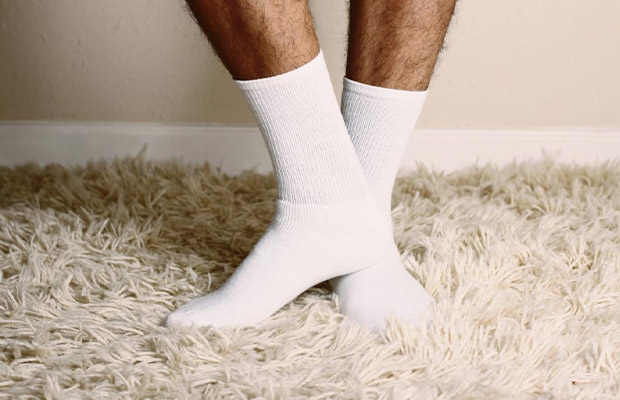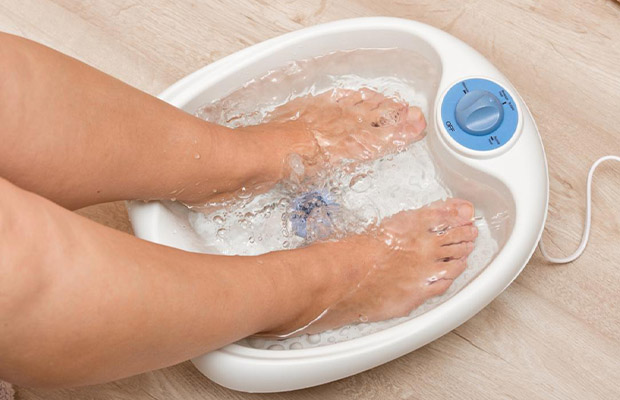Cold Sweaty Feet: Causes And Treatment

Cold feet is a term used to describe last-minute anxiety. But cold and sweaty feet are a whole other ballgame.
A common issue you can address can be indicated by cold and sweaty feet. On the other hand, they might point to a more serious medical condition that demands your attention. The most important thing to do is visit your family doctor or foot specialist when the problem becomes recurring.
In this article, we’ll focus on sweaty feet, how to prevent and treat excessive sweating, and what it may be a sign of. But first, let’s do a brief overview of why we sweat in the first place.
Read More:
Table of Contents
Why Do We Sweat?
Sweating is primarily a means of thermoregulation, which is achieved by the water-rich secretion of the eccrine glands. Sweating helps to lower body temperature when it rises by cooling the core. Sweating is your body’s reaction to hot temperatures because it releases heat and cools the body as it evaporates.
Not everyone perspires equally. Your sweat rate depends on your age, weight, muscle mass, health, and level of fitness. Your core body temperature can rise and your sweating rate can accelerate due to environmental factors like humidity, temperature, or even eating spicy foods.
Why Do My Feet Sweating But Are Cold?
When evaporation rapidly cools the feet, sweating may make the feet feel cold. This can often be caused by nervousness – literally “getting cold feet.” The arteries in the feet may not be supplying enough blood, which can also result in cold feet. The feet are cold to the touch in every one of these scenarios.
Possible Causes Of Sweaty Feet
Exercise
Exercise results in sweaty feet, which is not surprising. Your body responds to exertion during exercise by producing sweat to control body temperature. You’re more likely to sweat if you work out more vigorously. The same holds true for higher temperatures.
Hyperhidrosis
Hyperhidrosis is an abnormal over the sweating condition. Excessive sweat in this context refers to perspiration that is unrelated to activity, heat, or temperature. Unfortunately, the exact cause of hyperhidrosis is unknown; however, symptoms often stem from overactivity of certain sweat glands and social or physical stress.
People of all ages can experience excessive sweating, according to Yale Medicine. Yale Medicine adds the following regarding hyperhidrosis:
- Families often have a history of hyperhidrosis.
- Sweating can be brought on by certain medical conditions (like menopause).
- Many drugs have the potential to make you sweat a lot.
- Despite the weather, the issue still exists.
- Probably more people than are officially diagnosed have hyperhidrosis.
If left untreated, excessive sweating can lead to certain foot conditions and toenail conditions including nail fungus and athlete’s foot.
Hot Weather
Although it may seem obvious, the temperature and weather have an impact on your sweating rate. Since your body reacts to heat more strongly in the summer than it does in the winter, you sweat more. If you only sweat excessively during the summer or on hotter days, this may be the main cause.
Night Sweats
Repeated episodes of intense sweating are known as night sweats. It frequently has something to do with an underlying disease or medical condition. For instance, menopause and diabetes may be the cause of night sweats.
Does Sweat Cause My Feet To Smell?
No odor comes from sweat on its own. This is because sweat contains only a small amount (0.2–1%) of solute, which makes it almost entirely water.
However, if sweat is left on the skin for an extended period of time, bacteria start to grow and degrade the skin’s organic compounds. The medical term for smelly sweat is bromhidrosis. The buildup of bacteria, fungi, mold, and yeast on the foot causes this condition.
You should wash your feet every day, use antifungal powders, use deodorant, wear moisture-wicking socks, and spend money on the right shoes if you want to get rid of sweat from your feet as soon as possible. Below, we delve deeper into each of these approaches and components of your daily routine.
Home Remedies For Sweaty Feet
You can avoid foot odor this winter by taking a number of steps.
- Wear a different pair of shoes or boots the following day until your wet boots or shoes have completely dried out.
- To get rid of the outer layer of skin’s dead cells, exfoliate your feet.
As soon as you are inside, take off your warm boots so they can air out and prevent your feet from getting too hot. - If you have a tendency to perspire a lot, wear socks that wick moisture away and change layers of socks frequently.
- Wear breathable shoes so your feet can get some fresh air.
How To Get Rid Of Sweaty Feet?
- Wash your feet every day: Your feet can be reset by regularly washing them and drying them properly. The likelihood of bacterial and fungal infections on the feet is increased by moist skin.

- Dry your feet with antifungal powders: Sprays and powders can help prevent sweat buildup on your feet by absorbing moisture. For a complete selection of foot products, including those from Gehwol, the leading brand in the sector, visit the clinic.
- Moisture-wicking socks: A good pair of socks will wick moisture away from your feet. The best clothing to choose from is light, breathable clothing.
- Breathable footwear: Boots and formal shoes should be avoided as much as possible; instead, choose breathable footwear.
- Alternate use of footwear: To ensure that each pair of shoes in your collection is dry before use, it is best to switch between them. Your shoes will not only be more comfortable, but they will last longer because they won’t be subjected to as much continuous wear and tear in unfavorable circumstances (such as sweaty, damp, or wet).
Other Treatments
Injections of the botulinum toxin (botox) are another popular treatment option, but they can be uncomfortable and only provide temporary relief. Iontophoresis is a further alternative therapy.
You can get oral medications from your doctor, but many people don’t like the side effects, like dry mouth.
Remember that each of the aforementioned recommendations has different effects depending on the person. Most of the time, plantar hyperhidrosis does not necessitate a trip to the doctor, but if there is no improvement, that may be the next step.
If you experience more generalized sweating along with chills, changes in weight, or other symptoms, your doctor may inquire about medications that could be exacerbating the problem or they may look for another cause.
FAQs
Does Having Sweaty Feet Indicate Anxiety?
The International Hyperhidrosis Society estimates that hyperhidrosis affects up to 32% of individuals who have social anxiety. Hyperhidrosis, however, is typically a secondary symptom of social anxiety disorder and is not typically brought on by anxiety.
Does Having Sweaty Feet Indicate Diabetes?
While the feet may not sweat as much as the upper body, type 1 diabetics may notice that they do. People with diabetes frequently perspire excessively due to: (1) low blood sugar levels; or (2) nerve damage brought on by diabetes.
The possibility of night sweats is another complication of diabetes. Low blood glucose levels during the night are to blame for this. The Mayo Clinic reports that one side effect of diabetes medications is the development of night sweats.
